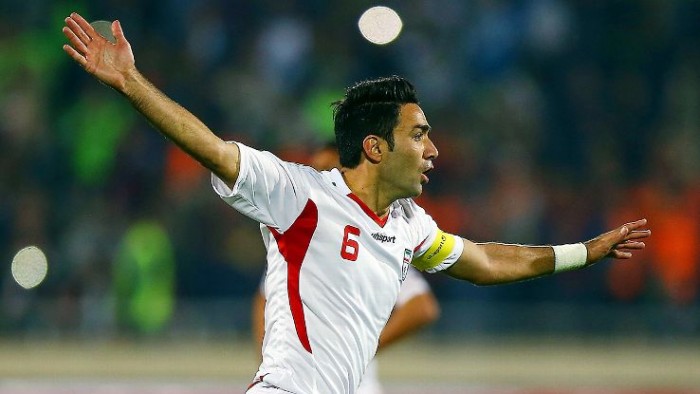Iran will miss Javad Nekounam — the talisman that allowed them to dream

ESPN.com – For Iran fans, positives from the departure of Carlos Queiroz as head coach of the national team in March are harder to find than space behind a defence organised by the well-travelled tactician.
One of the unintended negatives of his much-publicised spat with the Iranian Football Federation is that the international retirement of Javad Nekounam has been overshadowed. As much as the 62-year-old did for Iranian football in the past four years, nobody has done more than the Prince of Persia in the past 15.
It was fitting that in Nekounam’s last game for his country — his 151st and an Iranian record — the skipper found the net against Sweden, just days after doing the same against Chile in a fine 2-0 win.
They were his 38th and 39th in the international arena — not bad for a midfield anchor. Since making his debut against Ecuador in 2000, the 34-year-old has been immense. Coming into a team that contained the legendary Ali Daei and Mehdi Mahdavikia, he never looked out of place and before too long became the talisman of Team Melli.
In that time, Nekounam helped the team to the 2006 World Cup, though he could do little in the end as the dressing room in Germany split around Ali Karimi and Ali Daei. One wonders what would have happened if he had been a few years older and the captain of what was a very talented group of players. Soon after, he was given the armband and few have worn it with such distinction, leading Iran to the 2014 World Cup with a famous victory in South Korea in the final game of qualifying and a restoration of international respect.
“After the end of the Sweden game, it is time to say goodbye,” Nekounam wrote in a letter to his countrymen and women.
“During the tough times, you cried with us but we had the beautiful memories too when we qualified for the 2006 and 2014 World Cups. When we beat South Korea in Ulsan it felt as if a burden had been lifted from my shoulders and you could be happy and forget any problems.”
Carrying the weight of a nation’s expectations with such apparent ease and dignity is why this player, born in the suburbs of Tehran, became a legend of the Iranian game to a far greater extent than the more talented but mercurial Ali Karimi.
This was a man who delivered in the big moments, including a stunning free kick in qualification for the 2010 World Cup against South Korea in Tehran.
His set-piece potency was often overlooked but not this time, as a perfect free kick sent 100,000 fans in the Azadi Stadium wild. The player ran to the bench, banging his chest as he went, yelling “Nek-ou-nan” over and over; a primeval shout that was lost amid the roar. It was a player and captain at his peak, carrying a nation with him.
Nekounam is one of those athletes who, upon sitting down for a chat, seems smaller than on the pitch. So fierce is he in action, that the quiet and thoughtful side presented in hotel lounges and on the edge of training fields initially surprised.
Understanding English, his answers are considered and clear. Like his rival and peer Park Ji-sung, when he says this is the end, you know that it is; there will be no high-profile returns. This is it. It is not a decision made lightly.
Perhaps the difference with Park was that it is possible to imagine the Korean playing for his country and not being captain but not Nekounam. The two genuinely respected each other. Park may have won medals and trophies at Manchester United but Nekounam did something that is just as rare for an Asian player. He went to La Liga, stayed and impressed, spending six years at Osasuna, only returning home when the Pamplona club could no longer afford him.
It was a measure of how much he meant to the club that in 2014, when they were able to take him back, they did so. Now in the second division, Nekounam is once again in Spain and the captain. If retiring from international football extends his club career then there will be a small pocket of northern Spain that welcomes the news.
Yet when the men of Team Melli next take to the pitch to represent their country it will really hit home that Nekounam, leader and talisman for so long, is no longer there and never will be again. If any player has earned the rest, it is him.
John Duerden is ESPN’s Asia football correspondent who also works for BBC Radio, The Guardian and World Soccer. Twitter: @JohnnyDuerden




